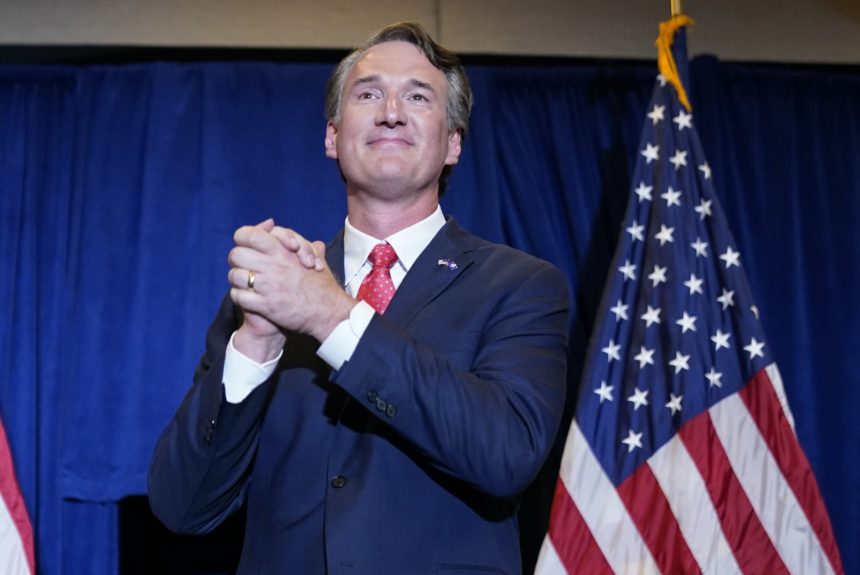The most important agreement reached so far during COP26 was made far outside Glasgow. Last night, the people of the Commonwealth of Virginia elected Republican Glenn Youngkin to be the state’s next governor in an upset victory over Democrat Terry McAuliffe that will shake up the climate debate.
Virginia’s off-year election is an extremely reliable bellwether that predicts each party’s success in the midterm elections that decide control of Congress. When the president’s opposing party wins Virginia, it almost certainly does extremely well in the mid-terms. For instance, in 2010 (President Barack Obama’s first midterm) Republicans gained 63 seats in the House of Representatives and six seats in the Senate after Republican Bob McDonald won the Virginia governor’s race handily with 59% of the vote. In 2022, Republicans only need to win about five seats to take control of the House of Representatives, a relatively easy task that looks almost certain after Youngkin’s upset win. Taking control of the Senate will be more challenging for Republicans but they only need one chamber to fundamentally change the power dynamics in Washington and end the Democrat’s trifecta of power (Democrats control the White House, Senate and House).
The anticipated power shift has big implications not just for the near future (2022) but the present. President Biden’s infrastructure and climate agenda is languishing because Democrats have taken themselves hostage and begged Republicans to not shoot. Youngkin’s win significantly weakens Biden and House progressives who have ignored climate scientists by linking climate action to unrelated social goals like universal pre-school and single-payer, government-run health care. Biden’s “Build Back Better” agenda and the bipartisan infrastructure package will face even more obstacles after last night and will have to be further streamlined.
COP26 delegates who want to understand where American politics is headed should pay close attention to the Conservative Climate Caucus and its chair, Representative John Curtis (R-UT). Curtis did an exemplary job of articulating the conservative climate vision on a recent appearance on CBS’ Face the Nation and in this joint op-ed with our president and my fellow co-founder, Drew Bond.
Curtis and other members of the Republican delegation who are headed to COP will be promoting economic freedom and amplifying the core conservative message that free economies are twice as clean as less free economies.
Partisan Democrats and central planners may be in a state of despair but there is broad and enthusiastic bipartisan agreement about the essential approach to climate action Bill Gates expressed very well in a recent post:
“Technological innovation is the only way the world can get to zero … [W]e need to invent new ways of doing them that are green. Then, after we invent them in the lab, we need to ‘commercialize’ them—that is, make them effective, reliable, and cheap enough that people want to and can afford to buy them.”
COP26 delegates and world leaders should note Gates’ use of the word “only.” As we often argue, innovation isn’t just a tool in the toolbox; it’s the engine.
Congressional Republicans and Democrats will still have a spirited debate about what it means to “commercialize” technology and how to do that, but power has shifted to the center where people who want some government and limited government can find agreement, especially in areas like research and development and infrastructure modernization. Weakening House progressives, who are obstructing broad bipartisan agreement, will open the door much wider to climate action that can pass. Strengthening the hand of members like Curtis, who has the temerity of being good on science and math by mentioning debt, will also lead to progress and durable solutions. If Members of Congress join Curtis in the real world of finite resources and discuss shifting priorities instead of raising taxes or printing money the range of options will expand even further.
Finally, last night’s results prove that the Republicans can win by focusing on core principles and their brand rather than Trump’s brand. Youngkin kept the former president at arm’s length and dramatically outperformed the former president in Virginia. Youngkin’s success is a blueprint for Republicans nationally, which bodes well for durable solutions on a host of fronts, including climate policy.
The views and opinions expressed are those of the author’s and do not necessarily reflect the official policy or position of C3.
